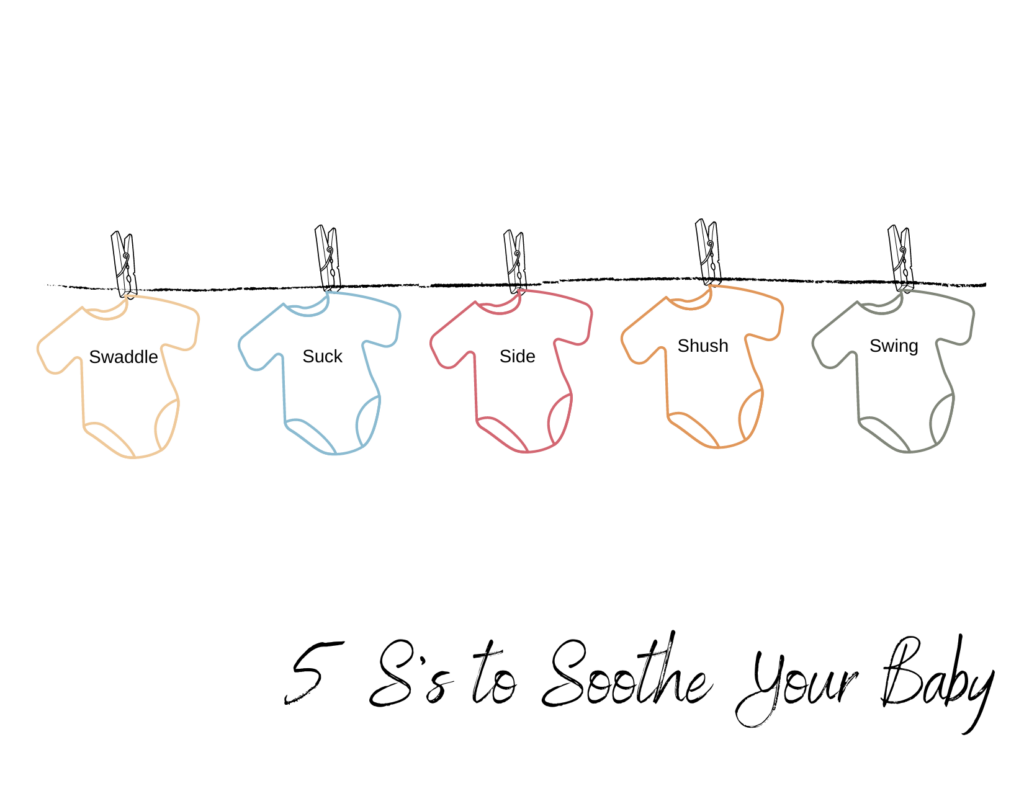A laid-back, information loaded blog for new moms who crave more from their motherhood journey.
The Doulatog Blog
Newborns undergo a significant transition from the womb to the world, where they can easily become overstimulated due to their immature nervous systems. Understanding the signs of overstimulation and effective calming techniques can greatly benefit both babies and caregivers.

Understanding Overstimulation
Newborns are incredibly sensitive creatures, having missed out on the comforting environment of the womb’s “fourth trimester.” Contrary to popular belief, the womb is not a silent sanctuary but rather an environment filled with constant noise, akin to the sound of a vacuum cleaner. This early eviction from the womb necessitates special attention to their sensory needs in the first few months of life.
Signs Your Baby Is Overstimulated
- Crying That is Difficult to Distract and Settle: Babies may cry intensely and find it hard to calm down.
- Withdrawing and Looking Away: They may avoid eye contact or turn their head away.
- Clenched Fists and Jerky Movements: Physical signs such as tight fists and jerky motions.
- Glassy Eyes: Eyes may appear unfocused or glazed. Turning away from stimuli, including parents or caregivers.
- Excessive Hiccuping: Hiccups occurring frequently.
- Changing Colors (Red and Splotchy Skin): Skin tone may fluctuate, becoming red or blotchy.
- Irritability (Resembling Tiredness): Babies may appear fussy or cranky.
The 5 S’s Method by Dr. Harvey Karp
Dr. Harvey Karp, a renowned pediatrician, suggests five techniques known as the 5 S’s to help calm an overstimulated baby:
- Swaddling: Wrap your baby snugly to replicate the feeling of being in the womb.
- Side or Stomach Position: Place your baby on their side or stomach while holding them to provide comfort.
- Shushing Sounds: Create calming white noise, like “shh” sounds, to soothe your baby.
- Swinging: Gently rock or sway your baby to mimic the movements they experienced in the womb.
- Sucking: Offer a pacifier or encourage breastfeeding to provide comfort and relaxation.

Additional Tips for Preventing Overstimulation
To learn more about creating a soothing nursery environment, check out my guide on Setting Up a Calm Nursery for Your Baby.
- Soft Lighting: Use dim lights like tea lights or red nightlights during nighttime feedings.
- Gentle Touch: Provide gentle strokes or skin-to-skin contact.
- Minimal Stimulation: Reduce noise and avoid overly stimulating environments.
Recognizing and responding to signs of overstimulation in your baby is essential for their well-being and development. By understanding their needs and using techniques like the 5 S’s, you can create a comforting environment that promotes relaxation and fosters a strong parent-child bond.
Remember, every baby is unique, so it may take some trial and error to find what works best for your little one. Trust your instincts and provide gentle, loving care to support their journey in this new and sometimes overwhelming world.
By following these tips, you can help your baby navigate their early months with comfort and security, setting a foundation for healthy growth and development.
For further reading on the importance of sensory stimulation in babies, visit this article by Child Development Institute.
A Deep Dive into the Consequences of Sleep Deprivation for New Moms, Dads, and Caregivers

Movies often paint a picturesque nighttime routine with a new baby: a simple lullaby, a flawlessly wrapped swaddle, and the nursery door closed until morning. Ah, if only reality mirrored the movies!
By now, you’ve likely realized that the dream of having your baby peacefully sleep in their own room is a far cry from reality, especially in the first few months filled with frequent feedings, constant wakings, noises, grunts, and diaper changes galore. The “grave shift” is a brutal one when you accept a seemingly permanent low power mode status. Navigating through these challenges can be overwhelming, but understanding their impact is crucial.
The Scary Truth On Losing Zzzs
Transitioning from the initial chaos to accepting your sleep-deprived reality can be a daunting journey. Besides being sluggish and feeling a little less attuned to your surroundings, you might initially believe that a little less sleep won’t be that big of a deal in the grand scheme of things. However, recent studies suggest anything but, emphasizing the far-reaching consequences that your lack of a good night’s rest can have on both your immediate well-being and long-term health, contributing to a diminished quality of life.
Now, let’s delve into the common challenges faced by new parents. Benedict et al. (2012) discovered that even a single night of sleep deprivation can heighten sensitivity to consuming unhealthy and convenient foods. For new mothers, the CDC recommends an additional intake of 300 to 400 calories to support the healing process. Whether or not you’ve opted for breastfeeding, extra calories are essential for overall recovery. This leaves new mamas especially vulnerable to low quality snacking decisions. Neuroscience researcher Dr. Stephan Guyenet, in his book The Hungry Brain, further explores how sleep deprivation increases the risk of obesity and unnecessary weight gain, particularly in high-stress, low-sleep environments. Dr. Guyenet provides evidence that, while stress usually decreases consumption of plain foods, it has the opposite effect when highly palatable foods are readily available (IE those delicious lactation cookies, snacks, and indulgent treats your family and friends dropped off when you first got home).

Adding to the challenge, researchers have found that poor-quality sleep significantly impairs spatial learning and memory (Newbury et al., 2021). The same study, conducted on rats to explore perinatal effects, revealed that anti-inflammatory activation, crucial for alleviating cognitive impairment caused by maternal sleep deprivation, was hindered.
Navigating Sleep Challenges: Tips for for a Restful Parenting
The good news? There are ways around sleepless nights and total exhaustion. Let’s explore some practical tips to overcome dreaded sleep hurdles.
Accept Help from Others:
- If possible, ask family or friends to jump in where you need them. Have them help out with laundry, watch the baby while you nap, or wash the heaping pile of dishes in the sink so you don’t have to bother in the kitchen.
- Consider hiring a certified postpartum doula to provide support during the night. Check out this blog post on the benefits of having overnight doula care.
Meal Prep When Possible:
- Set up a meal train before baby arrives. Friends, family, and neighbors can sign up to bring warm meals for you on specific days leaving more time for you and your partner to bond with baby and rest.
- Make use of your freezer and meal prep ahead. On the days where you are too tired to do anything but the bare minimum, pop a dish you’ve already made in the microwave or Air Fryer and *wah-lah,* a warm and healthy meal ready in under 5 minutes saving you both time and money.
Establish a Bedtime Routine:
- Create a calming bedtime routine for the baby to signal that it’s time to sleep. This can include water or bath time, turning on a white noise machine, dimming the lights, and turning off electronics for yourself at an early hour.
- Consistency in the routine can help regulate the baby’s sleep patterns and even prepare your body to hit the sack sooner rather than later.
Navigating the challenges of sleepless nights as new parents is tough. Acknowledging the impact of sleep on well-being, considering dietary choices, and seeking the assistance of a certified postpartum doula can transform the experience. Remember, you can’t pour from an empty cup! As you navigate through the chaos, I encourage you to embrace the imperfect and uncontrollable moments, find joy in the small victories, and savor the precious lulls and smiles that make it all worthwhile.
Resources in order of blog post appearance
(1) Benedict, C., Brooks, S. J., O’Daly, O. G., Almèn, M. S., Morell, A., Åberg, K., Gingnell, M., Schultes, B., Hallschmid, M., Broman, J.-E., Larsson, E.-M., & Schiöth, H. B. (2012). Acute sleep deprivation enhances the brain’s response to hedonic food stimuli: An fMRI study. The Journal of Clinical Endocrinology and Metabolism, 97(3), E443–E447. https://doi.org/10.1210/jc.2011-2759
(2) Centers for Disease Control and Prevention. (2022). Maternal diet. Centers for Disease Control and Prevention.
(3) Guyenet, S. J., & Aoki, S. A. (2017). The hungry brain: outsmarting the instincts that make us overeat. First edition. New York, Flatiron Books.
(4) Newbury, C. R., Crowley, R., Rastle, K., & Tamminen, J. (2021). Sleep deprivation and memory: Meta-analytic reviews of studies on sleep deprivation before and after learning. Psychological Bulletin, 147(11), 1215–1240. https://doi.org/10.1037/bul0000348







